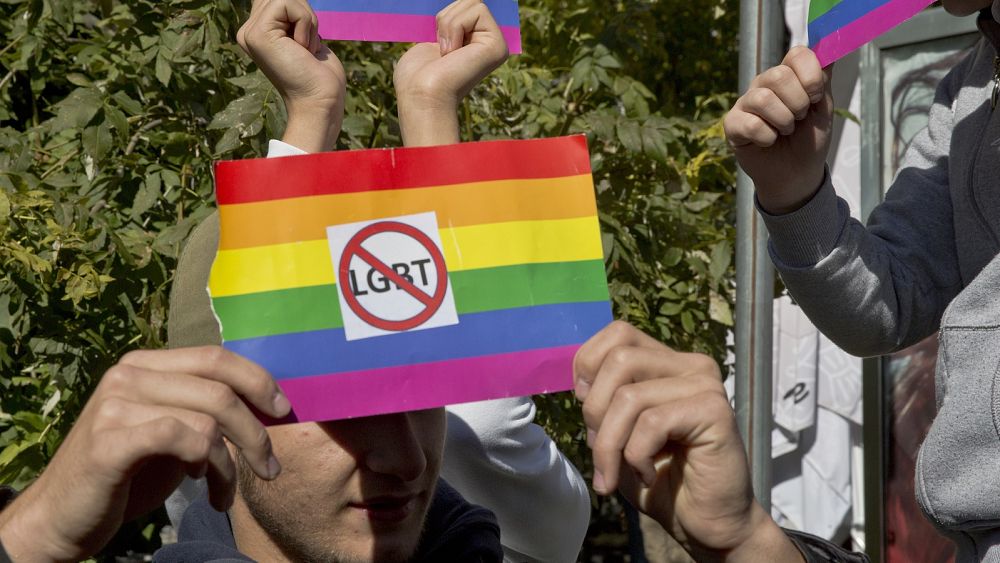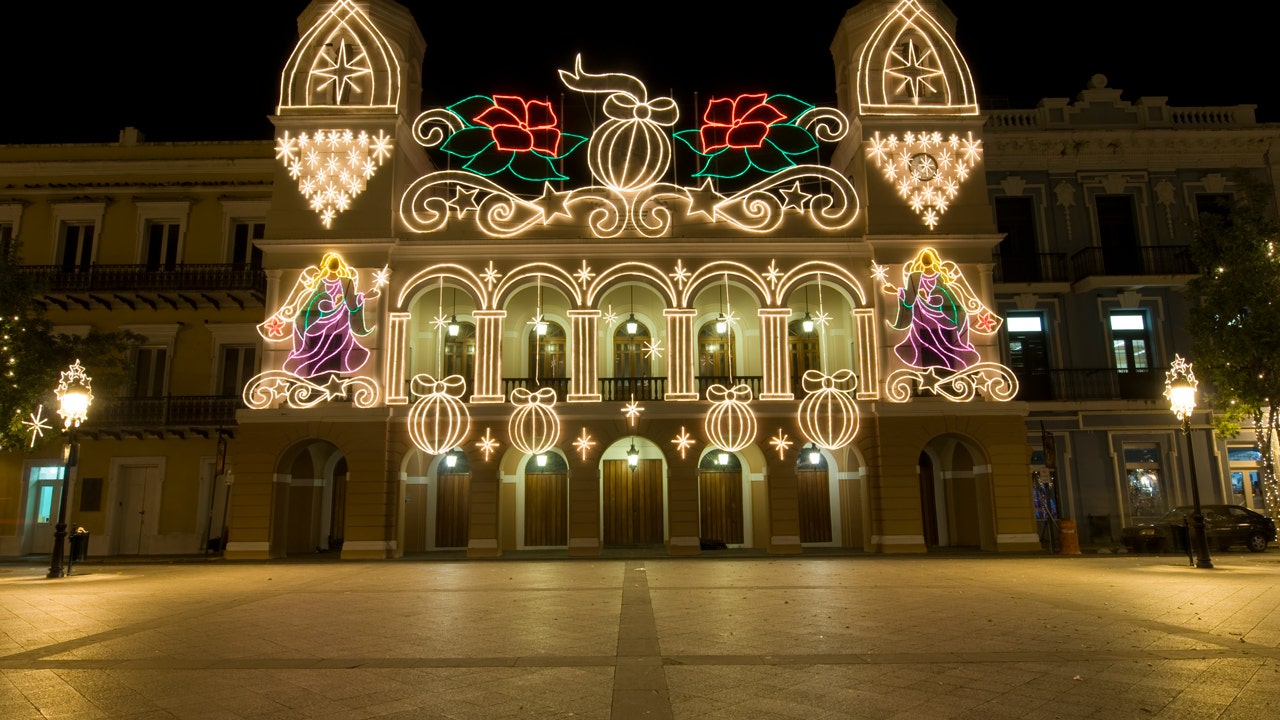World
How US & Russian conservatives help fuel anti-LGBTQ+ agenda in Europe

Foreign interference and growing anti-LGBTQ+ movements are threatening the European Union membership prospects of Western Balkan countries.
A growing network of foreign organisations are pouring hundreds of millions of euros into “culture war” groups campaigning to roll back LGBTQ+ rights across Europe, European lawmakers have warned.
In a resolution published earlier this month, the European Parliament raised the alarm about foreign interference in all democratic processes in Europe, pointing out that most of the foreign funding originates from Russia and the US.
This foreign interference, coupled with disinformation and numerous attacks perpetrated by malicious foreign actors, is predicted to increase in the lead-up to the European Parliament elections in 2024, becoming more sophisticated in nature.
MEPs flagged that at least 50 organisations now fund anti-gender activities — opposing what they call gender ideology.
“Europe is seeing a growing number of anti-gender movements, specifically targeting sexual and reproductive health, women’s rights and LGBTIQ+ people,” the EU parliamentary report read.
“Such movements proliferate disinformation in order to reverse progress in women’s rights and gender equality. These movements have been reported to receive millions of euros in foreign funding, either public or private, including from Russia and the US.”
Funding and modus operandi
The strategies employed by these foreign actors have evolved over time, due to increasing funding and intensifying disinformation campaigns, human rights observers have warned.
Members of the US far-right and the Russian Orthodox Church, two major players of the anti-gender movement, have joined forces to ramp up funding to Europe-based ultra-traditionalist actors with a specific focus on targeting LGBTQ+ rights, according to sources who agreed to speak to Euronews on condition of anonymity for fear of reprisal.
Over the past decade, key Christian right organisations, usually funded by private individuals linked to far-right and libertarian causes in the US, and Russian oligarchs have established a network of agencies set up in human rights institutions across Europe to carry out anti-gender diplomacy and infiltrate positions of power in member states.
Other tactics include abusive lawsuits intended to suppress, intimidate and silence critics (SLAPPS), money and reputational laundering, physical harassment, sending paid fight squads to LGBTQ+ marches or drag stores, hacking journalists’ devices with the Pegasus software and using troll farms spreading disinformation against LGBTQ+ activists.
And the movement is gaining momentum with more organisations from other countries, including Turkey, Saudi Arabia and Vatican City, closing ranks in their anti-LGBTQ+ lobbying and funding.
Their usual targets include minorities in unstable countries where they can exploit polarisation to radicalise the political debate and fuel violence, sources said.
Undermining the case for EU membership
Georgia’s gay pride festival on 8 July is the latest LGBTQ+ event to have fallen victim to foreign interference.
A mob of up to 2,000 anti-LGBTQ+ protesters from the Russian-affiliated group Alt Info, stormed Tbilisi’s festival in an attack described by Pride’s director Mariam Kvaratskhelia as “pre-planned”.
“I definitely think this [disruption] was a pre-planned, coordinated action between the government and the radical groups … We think this operation was planned in order to sabotage the EU candidacy of Georgia,” she told Reuters.
Members of Alt-Info, an ultra-conservative TV broadcaster with close ties to the Georgian Orthodox Church, had already disrupted Tbilisi Pride in 2021. Since its foundation as a conservative media platform in 2019, the group has tried to expand its political influence by creating an alternative party to both the governing Georgian Dream and opposition United National Movement. Among its stated goals is pursuing closer relations with Russia.
Alt-Info’s attack comes as Georgia has struggled with its EU membership application in recent years, despite overwhelming public and political support for EU integration.
The former Soviet republic’s path to EU candidacy has been slowed by deeply polarised politics and the excessive influence of vested interests in economic, political and public life, alongside its territorial dispute with Russia in the Abkhazia and South Ossetia regions.
And the cancellation of its Pride festival could deal yet another blow to its EU aspiration.
Roberta Metsola, the President of the European Parliament, condemned the “violent disruptions”, saying “anti-LGBTIQ rhetoric, disinformation and violence have no place in these debates”. The counter-protests represented a violation to the EU’s freedom of expression and right to peaceful assembly, the EU Ambassador for Gender & Diversity tweeted.
Divide and conquer
The same tension has broken out across Western Balkan countries where leaders have struggled to walk a fine identity and political line between anti-LGBTQ+ religious nationalist movements and pro-LGBTQ+ Europeanising public opinion.
While these countries generally have high levels of political and public support for joining the EU, their progress towards membership has stagnated over the past decade.
Religious nationalism has posed a significant challenge, as leaders from the Serbian Orthodox church, the Catholic church, and Islamic authorities have rallied behind their targeting of LGBTQ+ rights and formed coalitions with conservative political parties.
In recent years, anti-LGBTQ+ actions have turned more violent, with physical assaults by ultranationalist protesters on attendees of the Bosnia and Herzegovina Pride in March of this year, the Belgrade Pride in 2022 and the Zagreb Pride in 2021.
The controversy surrounding a veto that would have recognised same-sex unions in Serbia in 2021 is just another example of the growing conservative backlash against LGBTQ+ rights taking hold in Western Balkan countries.
‘The tip of the iceberg’
Yet, this trend is not unique to Western Balkan countries.
In 2021, the European Parliamentary Forum for Sexual and Reproductive Rights (EPF) unearthed more than $707.2 million (€600 million) worth of anti-gender funding from the United States, the Russian Federation, and Europe, specifically targeting LGBTQ+ rights across Europe between 2009 and 2018.
The wide-ranging report, which examined 117 anti-gender funding actors active in Europe, insisted the findings were only the “tip of the iceberg” as half of them — 63 — had no existing financial data.
“Of course there are enormous data gaps that cannot be filled at the moment, so $700 million is really the tip of the iceberg of how big this anti-gender movement is,” said EPF’s secretary Neil Datta.
According to Evelyne Paradis, executive director of ILGA-Europe, the anti-gender movement’s efforts to further polarise public discourse is dragging pro-democracy governments into fuelling prejudice and hatred towards LGBTQ+ people.
“The practice of scapegoating LGBTQ+ people is starting to be instrumentalised by both the pro-democracy and the anti-democracy sides. If you make it a marker of how good you are, then you’re creating this divide,” she told Euronews.
“This [growing polarisation] is not helping what should be a healthier, calmer conversation. What’s happening at the moment is the complete opposite.”
Instead, Paradis said pro-democracy governments need to move forward with their progressive agenda and steer clear of the perverse effects of foreign-funded polarisation.
“We’re all in reaction mode and it’s very hard to resist and be in a pro-active mode. Governments need to pass through the anti-gender movement’s negative agenda and keep on pushing our positive agenda. That’s where the strategy of the opposition is working – it’s really pushing everybody in the reactive mode.”

World
Christmas in Puerto Rico is a 45-day celebration with caroling, festive decorations, family feasts and more

Christmas, Navidad in Puerto Rico, extends far beyond Dec. 25.
The island proudly proclaims itself as having the “longest holiday season in the world,” according to the website Discover Puerto Rico.
On average, the holiday festivities in Puerto Rico last about 45 days, per the source, commencing right after Thanksgiving, and stretching all the way through mid-January.
The Christmas season in Puerto Rico typically lasts around 45 days. (iStock)
HOW TO SAY ‘MERRY CHRISTMAS’ IN 10 LANGUAGES TO FRIENDS AROUND THE WORLD
The holiday season in Puerto Rico is full of rich traditions beloved by families.
One tradition those who visit Puerto Rico will immediately notice during the holiday season is decorations.
In Puerto Rico, decorations are typically put up by Thanksgiving, and kept up until the season concludes in mid-January, with opportune picture moments at every corner.
Parrandas, Christmas caroling, is a holiday staple.
17 SECRET TRAVEL TIPS FOR FALL AND WINTER THAT AREN’T SO SECRET AFTER ALL
Carolers choose houses of family and friends to visit, typically starting around 10 p.m., performing aguinaldos (traditional Christmas songs), with not only their voices, but often with instruments as well, according to Discover Puerto Rico.
The group you begin caroling with is likely not the same group you end with.
In Puerto Rico, when carolers visit a house, they’ll often stop inside for conversation, food and drink before moving to the next residence.

Coquito is a popular beverage enjoyed during the holiday season in Puerto Rico. Coconut, vanilla and rum are among the ingredients. (Mayra Beltran/Houston Chronicle via Getty Images)
Usually, the residences of the house visited will join the group for the next house, according to Discover Puerto Rico.
CHRISTMAS TREES IN GERMANY WERE DECORATED WITH APPLES INSTEAD OF ORNAMENTS IN THE 1600S FOR ‘ADAM AND EVE DAY’
A night of serenading loved ones can last quite a while, often stretching into the early morning hours of the following day, according to the source.
The biggest day of the holiday season in Puerto Rico actually isn’t Christmas, but instead, the night before.
In Puerto Rico, Dec. 24 is Nochebuena. On that day, loved ones gather for the exchange of gifts, caroling and a large feast.
Many families will also attend a midnight Mass on the day, known as Misa de Gallo.
FLIGHT ATTENDANTS REVEAL THE SURPRISING DAY TO TRAVEL AHEAD OF THE CHRISTMAS RUSH
After Christmas passes, the festivities go on in Puerto Rico.
Another big event in the holiday lineup is Three Kings Day on Jan. 6, a holiday that “commemorates the visit that the Three Wise Men paid to Jesus after his birth,” according to Discover Puerto Rico.
On the eve of the day, children fill up a shoebox with grass to be left for camels to munch on while the Three Kings leave behind gifts for them, according to PuertoRico.com.
For a particularly festive Three Kings Day, Juana Díaz is the place to go, as it hosts the largest celebration in Puerto Rico for the holiday. In Juana Díaz, there is an annual festival and parade in honor of Three Kings Day that brings together over 25,000 people every year, according to Discover Puerto Rico.

Gifts are primarily exchanged between loved ones on Christmas Eve in Puerto Rico. (iStock)
Then, eight days later is Octavitas, a post-holiday celebration where families get together and celebrate one last time for the season.
The end of the holiday season is marked with the San Sebastián Street Festival.
This festival, spanning over multiple days, takes place in Old San Juan, and is filled with live music, dancing, shopping and parades.
World
Small plane crashes into Brazil town popular with tourists, killing 10

Twin-engine plane crashed in largely residential neighborhood of Gramado shortly after takeoff, authorities say.
A small plane has crashed into a tourist hotspot in southern Brazil, killing all 10 people on board and injuring more than a dozen people on the ground, officials have said.
The twin-engine Piper PA-42-1000 hit the chimney of a home and the second floor of a different house before crashing into a shop in a largely residential neighbourhood of Gramado shortly after takeoff from Canela, Brazil’s Civil Defense agency said on Sunday.
Rio Grande do Sul Governor Eduardo Leite told a news conference that the aircraft’s owner and pilot, Luiz Claudio Galeazzi, was killed along with nine members of his family.
Leite said that 17 people on the ground were injured, 12 of whom were still receiving treatment in hospital.
Galeazzi’s company, Galeazzi & Associados, confirmed that its CEO and Galeazzi’s wife and three daughters had died in the crash.
“Luiz Galeazzi will be forever remembered for his dedication to his family and for his remarkable career as a leader of Galeazzi & Associados,” the company said in a post on LinkedIn.
“In this moment of immense pain, Galeazzi & Associados is deeply grateful for the expressions of solidarity and affection received from friends, colleagues and the community. We also sympathize with all those affected by the accident in the region.”
Gramado, located in the Serra Gaucha mountains, is a popular destination for vacationers, especially during the Christmas season.
The crash comes a little more than a year after Brazil suffered its worst air disaster in nearly two decades when a twin-engine plane crashed in the southeastern city of Vinhedo, killing all 62 people on board.
World
Memes, Jokes and Cats: South Koreans Use Parody for Political Protest

As South Koreans took to the streets this month demanding the ousting of their president, some found an unexpected outlet to express their fury: jokes and satire.
They hoisted banners and flags with whimsical messages about cats, sea otters and food. They waved signs joking that President Yoon Suk Yeol’s declaration of martial law had forced them to leave the comfort of their beds. Pictures of the flags spread widely on social media.
The idea was to use humor to build solidarity against Mr. Yoon, who has vowed to fight his impeachment over his ill-fated martial law decree on Dec. 3. Some waved flags for nonexistent groups like the so-called Dumpling Association, a parody of real groups like labor unions, churches or student clubs.
Video by Yu Young Jin/The New York Times
Photos by Weiyi Cai/The New York Times
“I just wanted to show that we were here as part of the people even if we aren’t actually a part of a civic group,” said Kim Sae-rim, 28, who waved the flag of the dumpling group at a recent protest she went to with friends. Some groups referred to other local favorites like pizza and red bean pastries.
Kwon Oh-hyouck, a veteran protester, said that he had first seen such flags emerge during demonstrations in 2016 and 2017 that ultimately resulted in the removal of President Park Geun-hye. Mr. Kwon said that satire was part of the Korean spirit of protest.
“People satirize serious situations, even when those in power come out with guns and knives,” he said. “They are not intimidated.”
In the past month, protesters have come up with a wide range of unorthodox groupings. Some were self-proclaimed homebodies. Still others came together as people who suffered from motion sickness.
Video by Chang W. Lee/The New York Times
Photos by Weiyi Cai/The New York Times
Video by Weiyi Cai/The New York Times
Photo by Chang W. Lee/The New York Times
Lee Kihoon, a professor of modern Korean history at Yonsei University in Seoul, said that he believed the flags at this month’s protests were an expression of the diversity of people galvanized by the president’s attempt to impose military rule.
“They’re trying to say: ‘Even for those of us who have nothing to do with political groups, this situation is unacceptable,’” he said. “‘I’m not a member of a party or anything, but this is outrageous.’”
Some held signs ridiculing Mr. Yoon, saying that he had separated them from their pets at home and disrupted their routine of watching Korean dramas. One group called itself a union of people running behind schedule, referring to the idea that the need to protest over martial law had forced them to reschedule their appointments.
Photo by Weiyi Cai/The New York Times
Photo by Chang W. Lee/The New York Times
And of course, there were animals, both real and fake.
Photos by Weiyi Cai/The New York Times
South Koreans have shown that protests for serious causes — like the ousting of a president — can still have an inviting, optimistic and carnival-like atmosphere.
“I don’t know if the protesters realize it, but even though they’re angry, they haven’t gotten solemn, heavy or moralistic,” Mr. Lee said. “The flags have had an effect of softening and relaxing the tension.”
On the day that lawmakers voted to impeach Mr. Yoon, protesters who were K-pop fans brought lightsticks to rallies and danced to pop songs blasting from speakers. “Even though this is a serious day,” said Lee Jung-min, a 31-year-old fan of the band Big Bang, “we might as well enjoy it and keep spirits up.”
Video by Chang W. Lee/The New York Times
-

 Politics1 week ago
Politics1 week agoCanadian premier threatens to cut off energy imports to US if Trump imposes tariff on country
-
/cdn.vox-cdn.com/uploads/chorus_asset/file/25789444/1258459915.jpg)
/cdn.vox-cdn.com/uploads/chorus_asset/file/25789444/1258459915.jpg) Technology1 week ago
Technology1 week agoOpenAI cofounder Ilya Sutskever says the way AI is built is about to change
-

 Politics1 week ago
Politics1 week agoU.S. Supreme Court will decide if oil industry may sue to block California's zero-emissions goal
-
/cdn.vox-cdn.com/uploads/chorus_asset/file/25546252/STK169_Mark_Zuckerburg_CVIRGINIA_D.jpg)
/cdn.vox-cdn.com/uploads/chorus_asset/file/25546252/STK169_Mark_Zuckerburg_CVIRGINIA_D.jpg) Technology1 week ago
Technology1 week agoMeta asks the US government to block OpenAI’s switch to a for-profit
-

 Business1 week ago
Business1 week agoFreddie Freeman's World Series walk-off grand slam baseball sells at auction for $1.56 million
-
/cdn.vox-cdn.com/uploads/chorus_asset/file/23951353/STK043_VRG_Illo_N_Barclay_3_Meta.jpg)
/cdn.vox-cdn.com/uploads/chorus_asset/file/23951353/STK043_VRG_Illo_N_Barclay_3_Meta.jpg) Technology1 week ago
Technology1 week agoMeta’s Instagram boss: who posted something matters more in the AI age
-
News1 week ago
East’s wintry mix could make travel dicey. And yes, that was a tornado in Calif.
-
/cdn.vox-cdn.com/uploads/chorus_asset/file/24924653/236780_Google_AntiTrust_Trial_Custom_Art_CVirginia__0003_1.png)
/cdn.vox-cdn.com/uploads/chorus_asset/file/24924653/236780_Google_AntiTrust_Trial_Custom_Art_CVirginia__0003_1.png) Technology2 days ago
Technology2 days agoGoogle’s counteroffer to the government trying to break it up is unbundling Android apps






/cdn.vox-cdn.com/uploads/chorus_asset/file/25784221/247333_EOY_Package_Check_In_CVirginia_PRIME.jpg)









